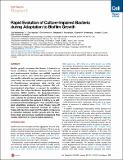Rapid Evolution of Culture-Impaired Bacteria during Adaptation to Biofilm Growth
Author(s)
Penterman, Jon; Nguyen, Dao; Anderson, Erin; Staudinger, Benjamin J.; Greenberg, Everett P.; Lam, Joseph S.; Singh, Pradeep K.; ... Show more Show less
DownloadPenterman-2014-Rapid Evolution of C.pdf (1.242Mb)
PUBLISHER_CC
Publisher with Creative Commons License
Creative Commons Attribution
Terms of use
Metadata
Show full item recordAbstract
Biofilm growth increases the fitness of bacteria in harsh conditions. However, bacteria from clinical and environmental biofilms can exhibit impaired growth in culture, even when the species involved are readily culturable and permissive conditions are used. Here, we show that culture-impaired variants of Pseudomonas aeruginosa arise rapidly and become abundant in laboratory biofilms. The culture-impaired phenotype is caused by mutations that alter the outer-membrane lipopolysaccharide structure. Within biofilms, the lipopolysaccharide mutations markedly increase bacterial fitness. However, outside the protected biofilm environment, the mutations sensitize the variants to killing by a self-produced antimicrobial agent. Thus, a biofilm-mediated adaptation produces a stark fitness trade-off that compromises bacterial survival in culture. Trade-offs like this could limit the ability of bacteria to transition between biofilm growth and the free-living state and produce bacterial populations that escape detection by culture-based sampling.
Date issued
2014-01Department
Massachusetts Institute of Technology. Department of BiologyJournal
Cell Reports
Publisher
Elsevier
Citation
Penterman, Jon, Dao Nguyen, Erin Anderson, Benjamin J. Staudinger, Everett P. Greenberg, Joseph S. Lam, and Pradeep K. Singh. “Rapid Evolution of Culture-Impaired Bacteria during Adaptation to Biofilm Growth.” Cell Reports 6, no. 2 (January 2014): 293–300.
Version: Final published version
ISSN
22111247